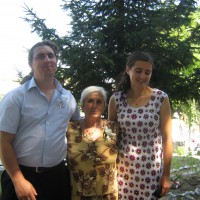Articolul conține informații despre efectele pe care migrarea masivă a forței de muncă în Uniunea Europeană a avut-o și o are atât pentru țările în care s-a migrat, cât și pentru cele din care s-a plecat.
The effects of labor migration in the European Union Efectele migrării forței de muncă în Uniunea Europeană
Interes general | Toate disciplinele
Propus de: sofi | 31.08.2020 14:57 | Revista cadrelor didactice nr. 67/2020 | 155 vizualizări
The effects of labor migration in the European Union
Tomescu Sofica
Migration is a phenomenon that has been manifested since the beginnings of mankind. It manifested itself with varying intensity over time, gaining new forms. Migration is increasing in many countries, which has in the long run determined the emergence of those multicultural societies. This phenomenon has an important role in contemporary social transformations. It is both a result of global change and an impetus for future changes in home states, but also in welcoming countries.
Bernd Schulte showed that migration has primarily a direct impact at the economic level, but also affects the field of work and social protection, the social protection system, culture and national politics, international relations, leading inevitably to greater ethnocultural diversity in all states.
Immigration is a reality of contemporary society, with economic, social and political implications. Supporting this idea, Anna Diamantopoulou, former European Commissioner for Social Affairs and Employment, highlights that, on the one hand, in the European Union, some Member States fear that they might be overcome and, on the other, there are criticisms that qualify the European Union as the fortress of Europe.
Migration is a complex phenomenon with a multitude of effects, not only at the community level. Beyond this framework, migration has a number of positive and negative consequences for all parties involved: receiving countries, countries of origin and migrant workers. Labor movement favors the dissemination of technical knowledge and modern working methods between countries affected by the phenomenon of migration. Also, in the European Union, free movement of people potentiates the acquisition of a European way of thinking. In theory, the free movement of labor, without intervention from the host or host state, has positive effects, balancing the benefits. On the one hand, in the country of origin the unemployment rate is decreasing and the wages are rising, the migration of the labor force reducing the imbalances in the labor market. At the same time, they appear new factors of economic growth: transfer of migrant income and improved qualifications of returning workers. On the other hand, in the destination country, the human resources reserve increases, which leads to a slowdown in wage growth and capital growth. According to classical theory, the migration process ceases when payments for work are equal in both countries. Migration is therefore a positive process for both sides. In the long run, there are no winners or losers.
The effects of labor migration in Europe are very complex, both in terms of economic and demographic aspects. In the years to come, the phenomenon of migration will have a growing role, producing economic, financial, social, cultural and political effects positive. For this reason, accepting new workers as a means of sustaining economic growth, but also of social security systems and pension schemes will be a perpetual concern for the European Union. Ensuring freedom of movement for people, especially workers, and maintaining a good level of border security, has both clear advantages for Member States of the European Union and cares for the potential risks and threats that can arise brings the emigrants. Different economic development generates differences in demand for labor with special structural features. Consequently, there are segments of the labor market in each country, even in the most developed ones, where the employment of native workers is declining. In the Member States of the European Union, the native worker rejects in many cases unattractive job offers even in the face of a high level of unemployment. Foreign workers, accepting poorly paid jobs without prestige, become system savers and factors of economic stabilization.
For destination countries, the influx of foreign labor is beneficial for supporting economic activities that the domestic labor market cannot cover, either due to the lack of qualified personnel in those areas, or because of the lack of interest in the domestic labor force for those sectors of activity. Also, the much more diversified offer of qualifications and skills allows employers to find the right people for various economic activities. Often, Member States facilitate access to highly skilled labor markets in the national labor markets, which has positive effects on economic efficiency, growth in revenues from certain economic activities and growth in general. Labor surplus not only leads to the growth and rejuvenation of labor supply, but also to the increase in consumption and thus to the general supply, resulting in GDP growth and, as a consequence, in improving the standard of living.
The negative effects of migration on countries of origin are due to the loss of highly qualified workforce, but also to the consequences of illegal migration, namely the need to integrate returnees into society and the labor market.
The effects of labor migration are very complex because migrants, on the one hand, increase the labor force of a country with the resulting consequences, and on the other hand it generates new jobs and increases the demand for a series by sectors of activity. At the level of the Community labor market, economic migration prevents growth or even reduces labor costs, thus contributing to increasing international competitiveness.
Bibliography
Diamantopoulou, A., Joint Conference of the European Commission and the OECD on Economic Issues of Migration, Brussels, 2003;
Schulte, B., Treatment of Third Country Nationals in European Community Law. The Status Quo,in ed. Jorens, Y., Schulte, B., European Social Security Law and Third Country Nationals, Max-Planck-Institut fur Auslandisches und Internazionales Sozial Recht, Munchen, 1989;
























Comentarii (0)
Nu există niciun comentariu
Autentificaţi-vă pe site pentru a putea publica un comentariu.